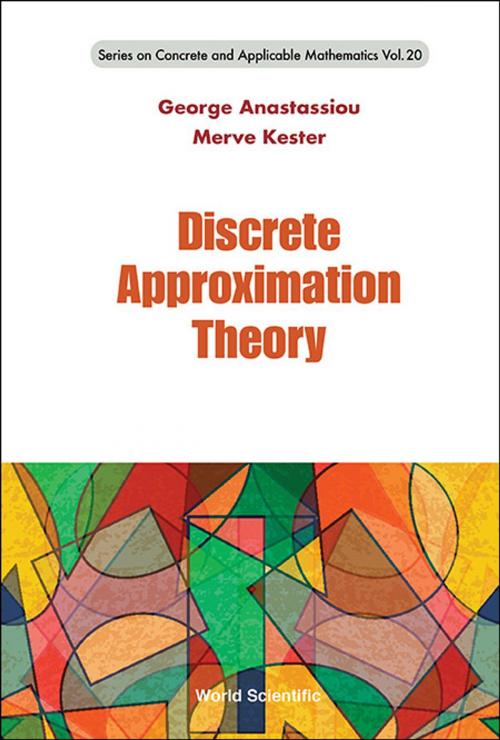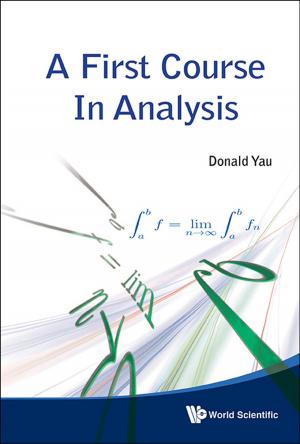Discrete Approximation Theory
Nonfiction, Science & Nature, Mathematics, Functional Analysis, Mathematical Analysis| Author: | George A Anastassiou, Merve Kester | ISBN: | 9789813145856 |
| Publisher: | World Scientific Publishing Company | Publication: | September 29, 2016 |
| Imprint: | WSPC | Language: | English |
| Author: | George A Anastassiou, Merve Kester |
| ISBN: | 9789813145856 |
| Publisher: | World Scientific Publishing Company |
| Publication: | September 29, 2016 |
| Imprint: | WSPC |
| Language: | English |
In this monograph, we present the authors' recent work of the last seven years in Approximation Theory. Chapters are self-contained and can be read independently and advanced courses can be taught out of this book. Here our generalized discrete singular operators are of the following types: Picard, Gauss–Weierstrass and Poisson–Cauchy operators. We treat both the unitary and non-unitary, univariate and multivariate cases of these operators, which are not necessarily positive operators. The book's results are expected to find applications in many areas of pure and applied mathematics, and statistics. As such, it is suitable for researchers, graduate students, and seminars of related subjects, and serves well as an invaluable resource for all science libraries.
Contents:
- Degree of Uniform Approximation by Generalized Discrete Singular Operators
- Degree of Lp Approximation by Generalized Discrete Singular Operators
- Voronovskaya Like Asymptotic Expansions for Generalized Discrete Singular Operators
- Degree of Approximation by Fractional Generalized Discrete Singular Operators
- Global Smoothness Preservation and Simultaneous Approximation by Generalized Discrete Singular Operators
- Approximation by Complex Generalized Discrete Singular Operators
- Degree of Uniform Approximation by Multivariate Generalized Discrete Singular Operators
- Degree of Lp Approximation by Multivariate Generalized Discrete Singular Operators
- Voronovskaya Like Asymptotic Expansions for Multivariate Generalized Discrete Singular Operators
- Global Smoothness Preservation and Simultaneous Approximation by Multivariate Generalized Discrete Singular Operators
- Degree of Approximation by Multivariate Complex Generalized Discrete Singular Operators
Readership: Graduate students and researchers interested in approximation theory.
Key Features:
- Self-contained chapters that can be read easily and independently
- An extensive list of references is given in each chapter
- Our study is extremely rare, the first book of its kind, filling a very important gap in the literature
In this monograph, we present the authors' recent work of the last seven years in Approximation Theory. Chapters are self-contained and can be read independently and advanced courses can be taught out of this book. Here our generalized discrete singular operators are of the following types: Picard, Gauss–Weierstrass and Poisson–Cauchy operators. We treat both the unitary and non-unitary, univariate and multivariate cases of these operators, which are not necessarily positive operators. The book's results are expected to find applications in many areas of pure and applied mathematics, and statistics. As such, it is suitable for researchers, graduate students, and seminars of related subjects, and serves well as an invaluable resource for all science libraries.
Contents:
- Degree of Uniform Approximation by Generalized Discrete Singular Operators
- Degree of Lp Approximation by Generalized Discrete Singular Operators
- Voronovskaya Like Asymptotic Expansions for Generalized Discrete Singular Operators
- Degree of Approximation by Fractional Generalized Discrete Singular Operators
- Global Smoothness Preservation and Simultaneous Approximation by Generalized Discrete Singular Operators
- Approximation by Complex Generalized Discrete Singular Operators
- Degree of Uniform Approximation by Multivariate Generalized Discrete Singular Operators
- Degree of Lp Approximation by Multivariate Generalized Discrete Singular Operators
- Voronovskaya Like Asymptotic Expansions for Multivariate Generalized Discrete Singular Operators
- Global Smoothness Preservation and Simultaneous Approximation by Multivariate Generalized Discrete Singular Operators
- Degree of Approximation by Multivariate Complex Generalized Discrete Singular Operators
Readership: Graduate students and researchers interested in approximation theory.
Key Features:
- Self-contained chapters that can be read easily and independently
- An extensive list of references is given in each chapter
- Our study is extremely rare, the first book of its kind, filling a very important gap in the literature















